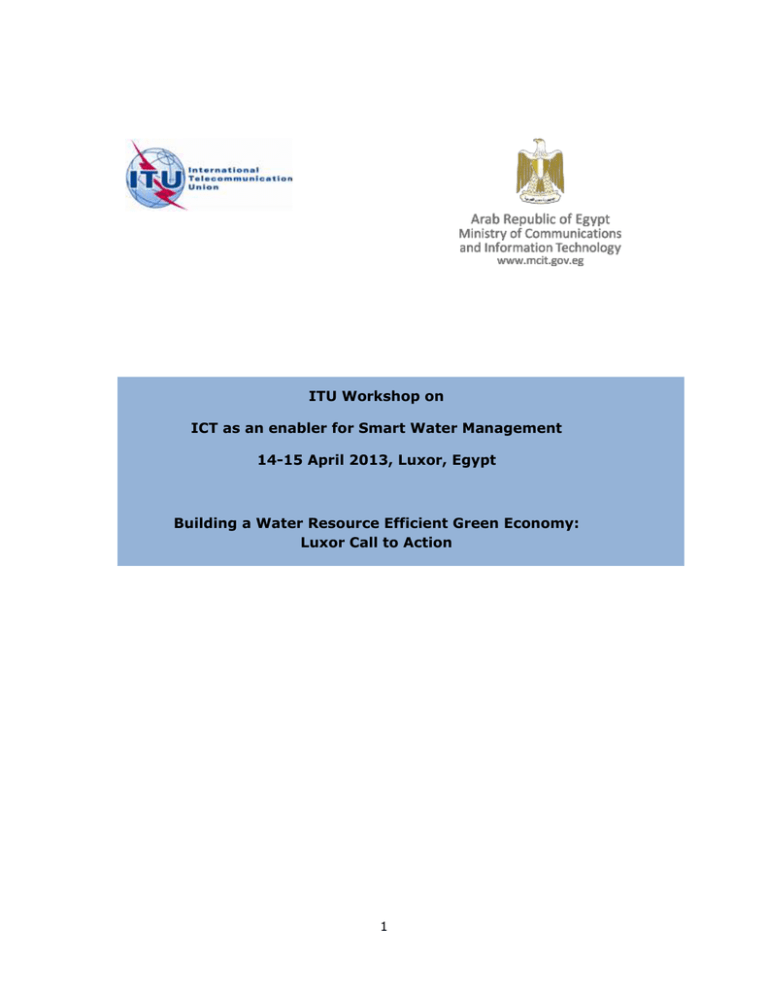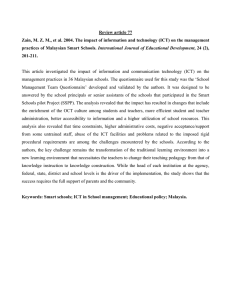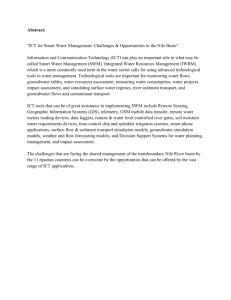ITU Workshop on ICT as an enabler for Smart Water Management
advertisement

ITU Workshop on ICT as an enabler for Smart Water Management 14-15 April 2013, Luxor, Egypt Building a Water Resource Efficient Green Economy: Luxor Call to Action 1 Recognizing ICT as a strategic enabler in the process of developing innovative solutions to address the problems associated with water scarcity and quality, and the analysis of environmental data that can enable researchers and climatologists to build more accurate models for weather forecasting, and for surface and ground water flow and contaminant transport simulation Acknowledging the need for increased water resilience and sustainability of cities and the need to raise awareness of the benefits associated with using ICT for smart water management in agriculture, domestic and industrial water use sectors, as well as the wider aspects of socio-economic development. We, the participants of the ITU Workshop on ICT as an enabler for Smart Water Management, meeting in Luxor, Egypt, 14-15 April 2013, call upon the ITU in collaboration with policy makers, water authorities, and relevant international and regional organizations, to: 1. Lead with vision: develop and foster the adoption of international standards, best practices, and policies for smart water management through the use of ICT to improve both water and energy footprints, taking into account life cycle assessments. 2. Evaluate: countries, standard performance indicators, and industry best practices for smart water management through the use of ICT and help countries to better utilize their water resources including different types of water. 3. Standardize: the methodologies for estimating the impact of ICTs on improving water conservation ; the ICT applications and services for smart water management so as to ensure interoperability and benefit from economies of scale; technologies for intelligent decision making for smart water management; and use of geographic 3 D modelling of geospatial data for use in geographical information systems and on the Internet; and open data platforms to enable interoperability of smart water solutions. 4. Think sustainable: bridge the gap between ICT, water, environment, energy experts and policy makers, to encourage the integration of ICT into water and energy policies so as to improve knowledge on the state of water availability and consumption, increase environmental resilience, tackle climate change impacts, and enhance energy efficiency and water demand management with the help of a cost benefit analysis of ICT tools. Promote the use of open data platforms in water management to empower innovation in the field. 5. Build a green economy: promote green products and services based on international standards that are developed on life cycle assessment, and raise awareness on the blue, green, and grey water footprints of commonly used products, services, and economic activities. 6. Share knowledge and raise awareness: Work on the whole ecosystem by raising awareness about the potential of ICTs in water management especially among farmers and beneficiaries in general, encourage water education, training and skill development of water authorities in order to enhance expertise in smart water management applications and organize similar workshops on an annual basis to review progress made. 7. Boost partnerships: enhance cooperation at international, regional, and national level, between organizations, research institutes, governments, and civil society, on the use of ICT in smart water management, and encourage developed countries to support efforts in developing countries. Create business models that would encourage partnerships among stakeholders through win- win solutions. 8. Shape the global agenda: integrate ICT policies in the on-going dialogue on smart water management in organizations such as the UN Water, World Meteorological Organization (WMO), Food and Agricultural Organization (FAO) and United Nations Environment Programme (UNEP), and others. 9. Demonstrate success and feasibility: carry out pilot and flagship demonstration projects to demonstrate “smart” ICT solutions for water management in agriculture, industrial processes, and domestic water consumption and quality, by utilizing new technologies and standards for smart water management, and benchmarking the situation in different countries. Identify strengths and weaknesses of implementation strategies, and report success stories and cost implications in dealing with the challenges met, and innovative solutions used. 10. Mobilize expertise: In relevant ITU Study Groups, and other groups as appropriate to pursue work in this important area. 2



